A LARGE crowd gathered in the centre of Ross-on-Wye on Saturday afternoon as a memorial bench was unveiled to the 255 British service personnel – and particularly three local men – who died in the fight to free the Falklands Islands.
The town responded to the appeal by the Ross branch of the British Legion for the memorial to Private Tim Jenkins and Guardsmen Gareth Griffiths and Colin Parsons.
Guardsmen Griffiths and Parsons – who were aged 31 and 18 respectively and part of 1 Welsh Guards – were among the 48 men killed by an airstrike against the Royal Fleet Auxiliary’s vessel Sir Galahad on June 8, 1982.
Private Tim Jenkins of 3 Para was killed in action on Mount Longdon on June 12, two days before the end of the war.
The metal bench features a map of the islands, which lie in the South Atlantic, 300 miles off the coast of South America, the figures of two soldiers, a jet, an aircraft carrier and the inscription: “From the sea – freedom” and the names of the three fallen.
It was officially unveiled by Private Jenkins’s great-niece Kitty Hatch, who along with mum Charlotte, raised £350 towards the bench, by selling home-made jams and pickles from outside their house near Ledbury.
Eight-year-old Kitty pulled away a flag of the Falkland Islands, which had been draped over the bench in Market Place, to dedicate the memorial in front of many local people, and members of both the British Legion and South Atlantic Medal Association 82 (SAMA) for the dedication.
The programme for the afternoon listed the names of all the 255 British servicemen and three civilians who died during the conflict.
More than 650 Argentinians also lost their lives in the 74-day war, which was prompted by the invasion of the Falklands on April 2, 1982.
In front of the bench were the standards and standard bearers of the Ross branch of the British Legion, SAMA, the Association of Wrens and the Monmouth branch of the Royal Engineers’ Association.
The ceremony opened with a welcome from Air Commodore Vivian Warrington, the president of the Ross and District branch of the Royal British Legion.
He said: “We honour these three young men, they gave their lives that others may be free.”
Prayers were led by the Rector of Ross with Walford and Brampton Abbots, Rev Sarah Jones.
She said: “In particular, we honour those from our community to whom this bench is a memorial of their sacrifice, Private Tim Jenkins, Guardsman Gareth Griffiths and Guardsman Colin Parsons.
“We unveil this memorial bench to stand as a reminder of their sacrifice, may it stand as a lasting symbol of their love for us, their community and their country.
“May it stand as a symbol of the love we have for each other and as a reminder to us and our community of the dangers we encounter.”
The deputy Lord Lieutenant of Herefordshire, Major Patrick Darling thanked all those who had contributed to the cost of the bench, which will be “a lasting memorial to those who lost their lives.”
He also thanked SAMA Wales and the Brecon branch of the Royal British Legion for contributing surplus funds from their appeals to the Ross memorial.
He added: “Any surplus funds from our collection will be given to SAMA Wales to pass on to their next Falklands memorial appeal.”
Wreaths will be laid in tribute at a dedication service for a memorial stone in Prospect Gardens on Thursday, November 8 at noon.
--------
‘As long as we draw breath, they will not be forgotten’
TREVOR Bradshaw, who served alongside Tim Jenkins in 3 Para in the South Atlantic, gave a moving tribute to his comrade and all who died in the conflict, including Guardsmen Colin Parsons and Gareth Griffiths.
He admitted questioning whether the sacrifice was worth it – until he met islanders at the 20th anniversary commemorations in 2002, when he was also able to erect a memorial to his friend.
Mr Bradshaw said: “My connection with the dedication of this bench is that I served with Tim Jenkins in 3 Para during the Falklands War, so in many ways this is a personal tribute to him.
“I never had the chance to meet Colin or Gareth, but of course I include them in this tribute and all who gave their lives in 1982.
“Tim was a local lad, born and raised in Ross, and he was very proud of his roots and his heritage. “He joined the Parachute Regiment at 17 and in doing so he followed in his father’s footsteps – his dad John had served with 3 Para in the 1950s and during his time Tim served in Northern Ireland, in Canada and France before making that fateful trip to the Falkland Islands, where he was killed in action on June 12 1982.
“As a veteran, I think events like this are incredibly important when we remember those who have given their lives – especially for the families who have lost loved ones – and that we keep their memory alive and their spirit with us and we have a permanent reminder of the sacrifice they made.
“I think it is wonderful the people of Ross have come together and this event has taken place.
“The Falklands War was a short, but at times very sharp, engagement that took place in a very challenging environment where the weather was often appalling, the terrain we had to traverse was extremely difficult and, of course, we faced an enemy who did not want to give up the ground they had taken.
“Tim lost his life during the battle of Mount Longdon, a battle in which nearly 100 young men from 3 Para and attachments were either killed or wounded and, of course, we know that over 250 servicemen and three civilians lost their lives – a heavy price to pay.
If I am honest, I have asked the question: Was it worth it? Was it worth the loss of life? Was it worth the pain, the distress to the families that is still present and still very raw today?
“I guess different people would have different answers to that question.
“In 2002, I was fortunate to be included in a pilgrimage to the Falklands where 250 servicemen who had been there from the army, navy and air force went back down to commemorate the 20th anniversary.
“I had two main aims: one was to try and answer that question: “Was it worth it? Did it make a difference? Do the Falkland islanders care? Do they remember what happened?
“I was pleased to find the answer was a resounding yes.
“It has made a tremendous difference to their lives – they are able to live in freedom as British citizens as they choose.
“They are acutely aware of the price that was paid for that and they strive in their daily lives to keep alive the memories of those who lost their lives – I found that reassuring and comforting to know.
“The second reason for me was that I wanted to find the place and mark the place where Tim fell.
“It didn’t feel right to me that someone could come across that place and not know that a young man had given his life for his country and not know the events that had taken place.
“So, during the course of that week, I retraced our steps up Mount Longdon and after several hours of searching I managed to identify certain features on the ground and artefacts that were still there and I managed to identify the exact spot where he lost his life.
“The weather gods were kind to me that day – the wind dropped, the sun came out and I was able to spend a marvellous afternoon gathering rocks from the local area.
“I built a mound and in that I set a plaque which I had taken explaining who Tim Jenkins was and what had happened there.
“I was able to pay my respects to my friend and let him know that he was not forgotten and it was an incredibly cathartic and healing experience.
“Ten years later I had the privilege of returning, this time with his dad John and his wife Jean, with three other members of 3 Para.
“We were able to take them around the island, to show them where we had been, to share some of our experiences, to share some of our memories of Tim.
“They were able to experience the gratitude and dignity of the islanders and we were able to take them to the place where Tim fell.
“Although it was a difficult and moving experience for John and I, I think it brought him comfort to know that place was marked, to know that his son was remembered, to know it gave it value and worth and that he did not die in vain, that he was not forgotten.
“There is now a permanent reminder of where Tim Jenkins fell.
“And now there is a permanent reminder here in Ross of those who gave their lives in the Falklands in the form of this bench.
“It is my hope that as the families, particularly those of Colin, of Gareth, of Tim, as they sit on this bench and reflect and remember, that it will also bring them comfort to know that they are not forgotten, that others care and that others miss them too.
“I want to thank everyone who has contributed to this, particularly the local British Legion and especially (branch secretary) Margaret (Jones) who, I think, has been the driving force behind it.
“As a veteran, and with the other veterans here, it means a great deal to us to have this permanent reminder.
“I’m sure it means a great deal to the families, and I think if Tim and Gareth and Colin are looking down on us it would mean a great deal to them too – to know they are remembered, that we honour their sacrifice and as long as we draw breath, they will not be forgotten.”
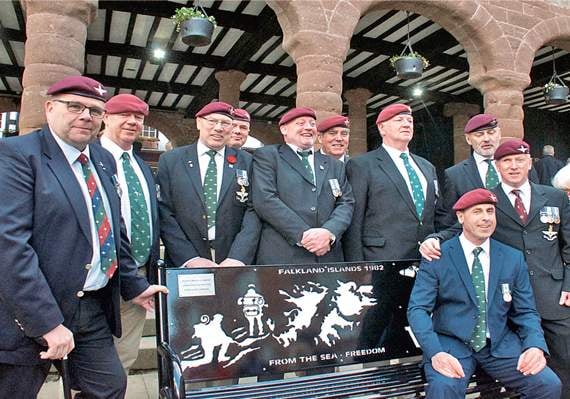
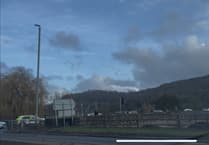
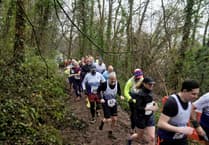
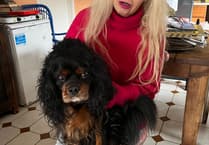
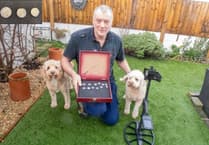
Comments
This article has no comments yet. Be the first to leave a comment.